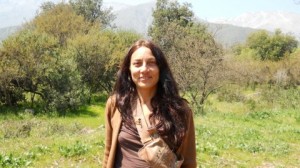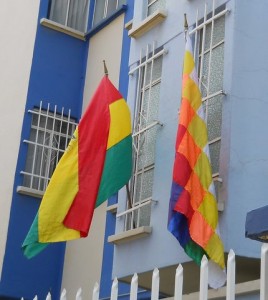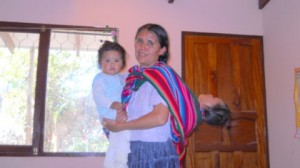page 2
Forcing the truth through cracks in the wall
With billions of dollars poured into television production and near-complete domination of printed media, the mega-corporate media shapes reality. Using media’s enormous seductive powers, information is made to fit into a carefully designed frame in which the economic and political status quo are made to appear to be the only possible alternative. Full membership in the “sociedad de consumo” defines the “good life.” The “benefits” of unrestrained consumerism, financed by frighteningly high levels of personal debt, are depicted as fundamentally incompatible with the struggle for significant societal change.
The attempt to rescue thirty-three miners trapped in the San Jose mine, for example, monopolized the airways continuously recently. Virtually no attention was paid to the unsafe conditions that led the miners to be trapped in the first place. No connection was drawn between the trapped miners and the deaths, only a month earlier, of six workers transporting mining-related explosives in Soquimich. Cristian Cuevas, a director the Central Unico de Trabajadores (CUT), Chile’s largest labor union, spoke to me forcefully of how Chile’s current right-wing president, Sebastián Piñera is able to bask in the sun of international publicity for the rescue of the miners while the copper workers he represents are subcontratistas, contract workers with no rights, no pensions, and no protection against deplorable, dangerous, and inhuman working conditions.
Yet, despite the enormous advantage of massive corporate funding of mainstream media, many people are making increasingly effective use of alternative ways to get a politically meaningful message across. Paulina Acevedo, for example, activist and journalist for Observatorio Ciudadano (http://www.observatorio.cl/) has made active use of Internet-based media to validate the legitimacy and importance of Chile’s indigenous population, the Mapuche, in their struggle for their ancestral rights. The Mapuche are descendants of the peoples who populated Chile long before the colonizers claimed it for their kings. Colonial and neocolonial powers have done all they can to destroy the indigenous people’s culture, imposing their language and religion. They have deprived the people of their lands, enslaving them or “allowing” them entry to society only at the lowest level of subsistence. Acevedo stressed that the people are not so much “poor” as impoverished. They are made poor by others who enrich themselves.
The Mapuche, one of the few indigenous populations to successfully resist colonization by the Incas, continue to struggle for their identity and their rights. Many protestors have been arrested. The Concertación, the coalition of Chilean parties that formed the government that followed the dictatorship, imposed draconian “anti-terrorism” statutes enacted by Pinochet’s edicts and left unaltered in twenty years of Concertación leadership. The Mapuche responded with a hunger strike of more than eighty days. Because of the international attention drawn by activist-journalists like Acevedo and by protest marches, Piñera dropped the charges under the terrorism act. This only one episode in an enduring struggle, but it demonstrates that dissemination of truthful information can have powerful effects despite the monolithic media’s attempt for total control.

While Acevedo works in the mode of an activist-journalist, others have found novel means of increasing public awareness of repression. The artist Voluspa Jarpa has had printed a set of books comprising the CIA’s declassified documents released to the public. She calls the work the “La Biblioteca de la No Historia de Chile,” (“The Library of the the Non-History of Chile”) because most of the text has been so heavily blacked out by the CIA that it says almost nothing. With irony, Jarpa shows the front page of El Segundo on the day of the WTC attack handled in this same manner. Because of the interest stirred by her art, Jarpa has attracted television attention, enabling a glimpse of alternative information within the mainstream media.

Theater arts are yet another active front to reach the public. Leopoldo Pulgar, for example, a theatre critic who writes for Chile’s small but vocal periodicals of the left, has helped bring positive public attention to avant garde works, such as recent productions, Chef and Siameses, that sharply challenge the image of the middle class, the “sociedad de consumo,” as a satisfying mode of existence.
At the same time, more traditional means of reaching the people are not neglected. Cristián Cuevas, in addition to his responsibilities organizing the copper workers, is also charged with the political formation of union cadres. As a man who became an activist as a high school student struggling against the dictatorship, Cristián Cuevas describes himself today as an Allendista and emphasizes the crucial importance of providing a broader perspective by addressing fundamental issues of dignity, respect, and working conditions while simultaneously struggling for equitable wages. Strikes and demonstrations remain as crucial as ever, not only to give weight to workers’ demands, but to educate both participants and observers on the inherent violent inequities of the neoliberal model. Demonstrations and strikes remain crucial tools in bringing these violent injustices to light.
Cristián understands well that the struggle has to be waged on many fronts. Cristián has dared to openly acknowledge his homosexuality by active participation in gay rights marches in a society in which machismo and sexual conservatism still predominate. That climate is being challenged on other fronts as well. A group of university psychology students has organized marches, funas (mock funeral marches to call attention to individuals who have evaded public notice for misdeeds), and conferences adamantly protesting discrimination against homosexuals. Contrary to international standards, many Chilean colleges continue to teach that homosexuality is a disease to be cured by psychotherapy. These young people are actively organizing demonstrations and conferences to challenge the established authority’s sanctioning of reactionary social policy. Juan Carlos, a spokesperson for the group, spoke forcefully about the willingness of students to put themselves on the line, to demand these rights and to insist that psychology respect individuals whose sexual preferences do not fit rigid traditional norms.
It was interesting to see some of the most vocal opposition to the status quo emerging from this group of psychology students. With much of contemporary psychology, both in the US and internationally, focused on neurophysiology and psychopharmacology, relatively little attention is paid to the psychological need to struggle for dignity, for equality, and for community in the sense as empathic connection to our fellow beings in order to find meaning in life. While many psychologists of the mid-twentieth century (Erich Fromm, Viktor Frankl, and Herbert Marcuse, H.S. Sullivan, for example) recognized the crucial importance of personal involvement in questioning the status quo and active participation in social change as fundamental to psychological health, current U.S. psychology largely ignores this need. In Chile, the life-long activist and Allendista, the psychiatrist Luis Weinstein continues to stress the importance of working for a higher level of community as essential to psychological well-being. It is this commitment to the human community that gives meaning to life. It is not simply a matter of winning or losing, but of giving significance to one’s life by struggling for change.
Bolivia’s indigenous peoples demand their rights
As the Mapuche are at the forefront of the struggle in Chile, Bolivia’s indigenous peoples, who comprise the majority in Bolivia, are on the front lines of change. Among the most disenfranchised, oppressed, and impoverished peoples of the world, they dare to raise their voices and place their lives on the line. When enactment of a new constitution was being blocked by the local business oligarchy in Bolivia’s congress, indigenous peoples took to the streets to demand ratification. For the first time in history, the Bolivian constitution now recognizes that it is not a single nation-state, but many nations joined together, each with its own history and cultural heritage. Evo’s government has enacted a new law makes illegal all forms of discrimination, particularly the ubiquitous racial discrimination.


The victory of Evo Morales and of the indigenous peoples of Bolivia, is simultaneously both extremely important and painfully limited. The multinational corporations make clear that critically important development funds will instantly dry up if Morales’ government does not yield to their wishes. The local oligarchy, cloaked in business degrees from U.S. institutions, revolts. They pull with them the “middle class” that, like Chile’s middle class, is a relatively small percentage of the total population that has been all but custom-designed by neoliberal economic strategies to support the status quo. The gap between the moderately comfortable and those living at or below a subsistence level remains enormous. Though Morales’ government eases some of the desperation with bonos, cash payments direct to the aged and those with school-aged children, it can only scratch the surface of centuries of inequality that leave millions without access to potable water, public hospitals, or police protection. Even those who fully support Morales acknowledge that this gap far exceeds what the government can erase.
This is a complex struggle. While Morale’s government makes progress in some areas, it also impedes change in acceding to the multinational corporations and local business oligarchy. It favors a select few organizations while clamping down repressively on others. Eliana Quiñones of the Fundación Abril (an organization founded by Oscar Olivera who led the successful battle against Bechtel for control of Bolivia’s precious water resources) sees Evo’s government as standing in the way of grassroots organizations such as the foundation’s Escuela del Pueblo (www.fundacionabril.org). Calixto Vasquez, who works with grassroots organizations on the outskirts of Cochabamba expressed similar frustration. The Red Tinku (see, for example, http://www.youtube.com/watch?v=SZ9Fy1XnuU0) , a group that counters the corporate media with informative placards in the plazas, has found itself the target of government agencies trying to remove them in an effort to “clean up the image” of public places.

With these provisos, the significance of the rise of indigenous power should not be underestimated. Casimira Rodriguez, for example, an indigenous woman appointed by Evo to be Minister of Justice in 2006, stresses how people who have been treated like dirt in their own country are finally achieving recognition and respect. With fierce determination and political clarity, Casimira stresses, as did many others, that “fundamental changes in the self-perception, in the dignity of indigenous peoples, are irreversible.” It is this kind of irreversible change that Chile’s Mapuche are battling to achieve.


Once people commit themselves to work for change, even the horror of imprisonment, torture, and exile does not stop the will to fight. The Bolivian documentary filmmaker Ismael Saavedra, who leads student filmmaking group trips to Bolivia for the Vermont-based School for International Training, recently filmed a reenactment his own torture at the hands of the García Mesa’s violent military coup, contrasting it with the jubilance of Bolivian indigenous villagers at a celebration for Evo Morales on his historic victory. Innumerable people in both Bolivia and Chile have continued their struggle despite bearing permanent scars from inhuman tortures they absorbed at the hands of military dictators in their countries.
Keeping the flame lit
In the contemporary world where everything appears to change so rapidly, it is a challenge to envision long-term changes. Yet this is a long struggle, and there are many painful setbacks and few incontestable victories.
Now is a time, perhaps, for memorizing the books. It is a time to pass on the understanding that oppression, subjugation, and impoverishment of the people are not the inevitable consequence of civilization but the specific consequence of rapacious capitalism in its wolf-in-sheep’s-clothing guise of neoliberalism. La lucha continua — the struggle continues — is a theme heard repeatedly in Chile and Bolivia where a great many recognize that their need to struggle must go on because of the urgency of the need for change and regardless of the forces arrayed against them.

